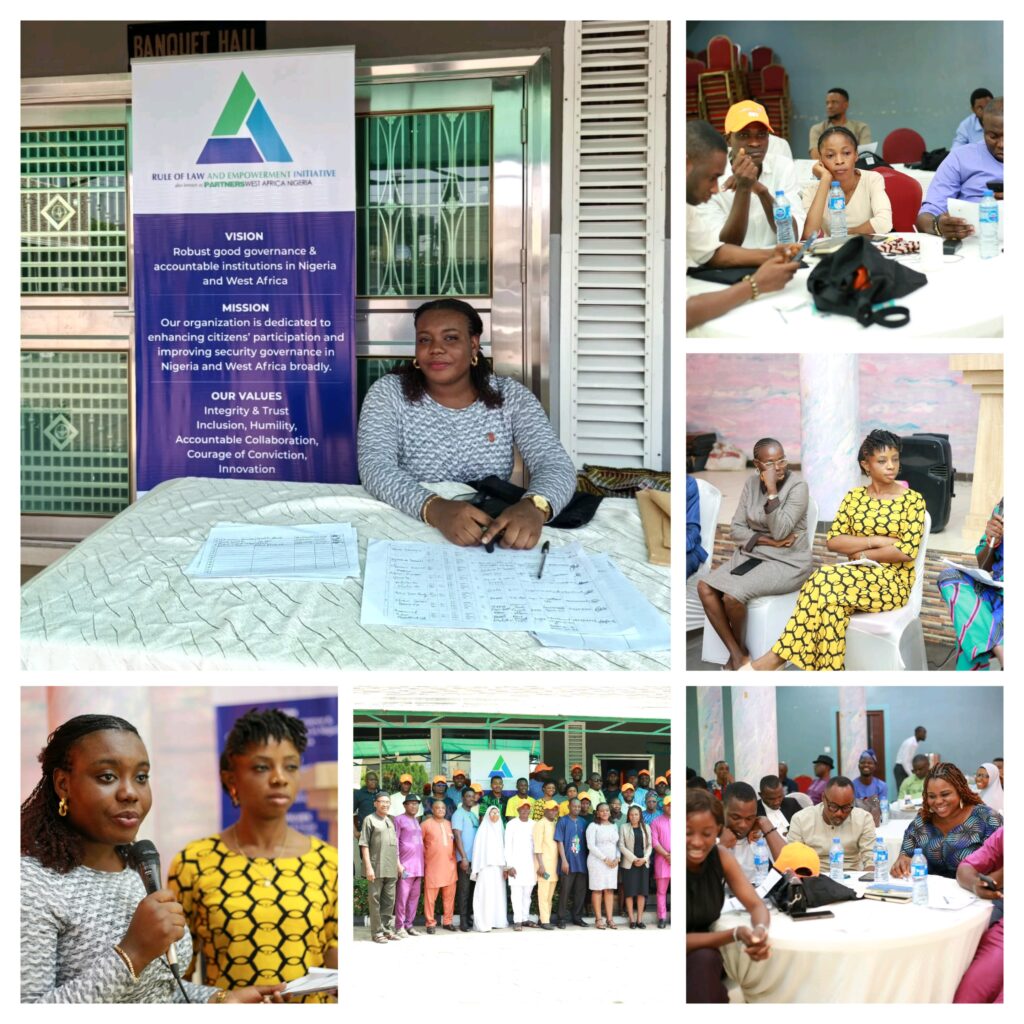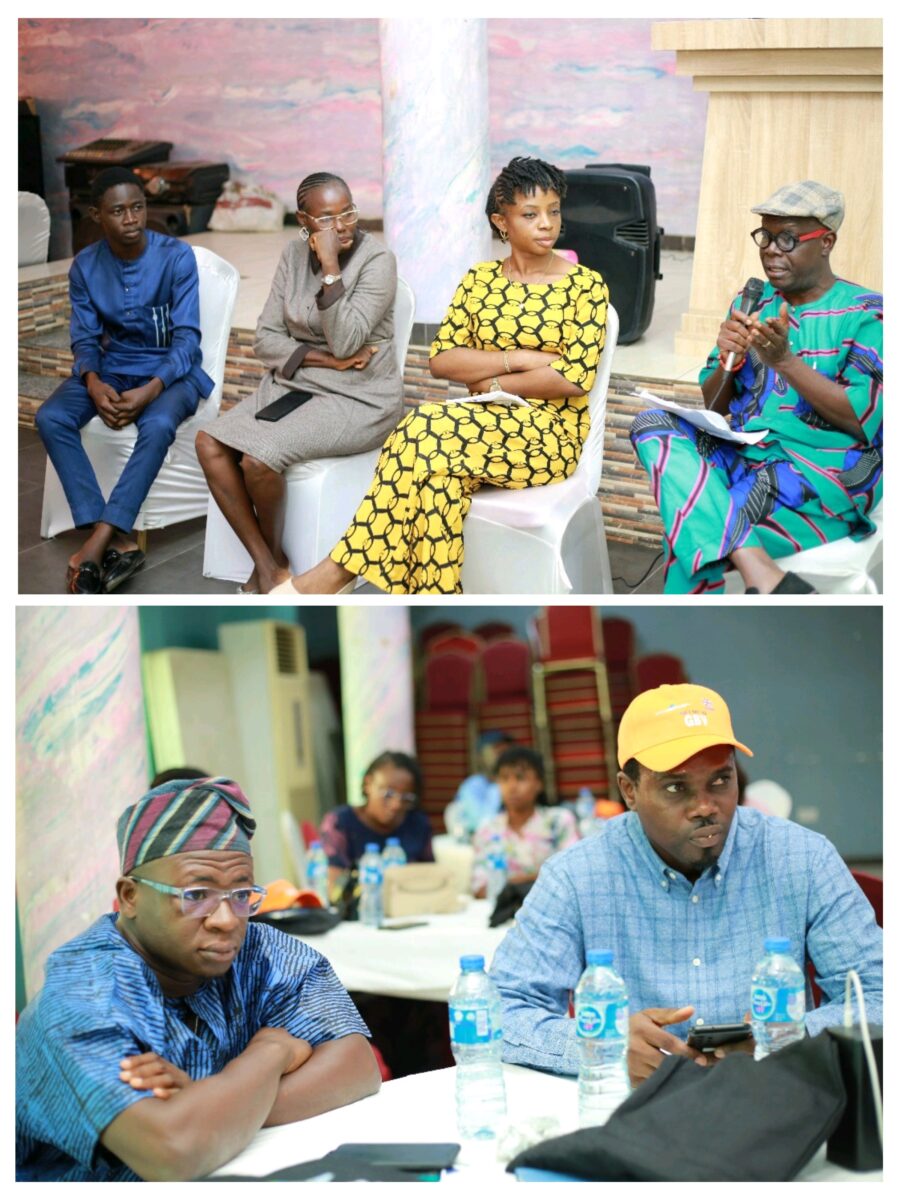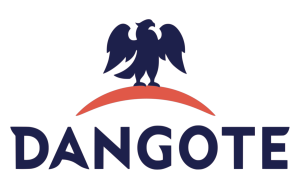POLICE ACT 2020 : PWAN Media Town Hall Meeting ,Seeks Avenues To Build Trust Between Police, Public ,For Enhanced Human Rights

Share this Post
By Emmanuel Edom

Over 40 Journalists and Media practitioners from different media outfits in the South West zone of Nigeria, yesterday, November 28th, 2024, converged in Ikeja , Lagos State, to jaw- jaw and deepen public understanding of Nigeria’s security governance framework.
The enlightenment program was tagged Media Town Hall Meeting On Human Rights, The Police Act 2020, which came under the auspices of a Right Organization,’ Rule of Law and Empowerment Initiative, also known as Partners West Africa Nigeria,(PWAN).
PWAN center piece and focus on their first Media Town Hall Meeting was On Human Rights, The Police Act 2020 And Regulation .
The event was supported by the UK Integrated Security Fund of the Foreign Commonwealth Development Office (FCDO).
In an opening speech by Kemi Okenyodo, Executive Director of PWAN, which was delivered by Holly Mohanye,the initiative was described as part of the organization’s efforts to improve security governance and enhance citizens’ participation in Nigeria and West Africa.
Through its core programs on the Rule of Law, Citizens Security, and CSO strengthening, PWAN continues to promote transparency, accountability, and trust between law enforcement agencies and the public.
The town hall meeting is an integral component of the broader project titled Enhancing Police Governance: Deepening Understanding of the Police Act 2020 and Regulations Across Nigeria. This project is being implemented in key states, including Kano, Plateau, Borno, Edo, Lagos, Enugu, and the Federal Capital Territory, to address critical gaps in the application of the Police Act 2020 within the Nigerian Police Force (NPF).
According to the statement, the Act represents a significant milestone in Nigeria’s security reforms, shaping the dynamics of police-citizen interactions while prioritizing human rights. The town hall aimed to educate media practitioners and the public on the Act’s provisions and the media’s critical role in fostering responsible and rights-based reporting. Discussions emphasized reporting on sensitive issues such as arrests, stop-and-search operations, and profiling, all while contributing to a culture of accountability within law enforcement.
The meeting focused on unpacking the Act’s critical provisions, exploring the media’s role in advancing informed reporting, and identifying strategies to bridge gaps in understanding and implementation of the Act across the country.
The initiative highlights the importance of collaboration between stakeholders to ensure the success of these reforms. Participants were encouraged to actively engage and share their perspectives, with the overarching goal of empowering communities and law enforcement to foster mutual respect and accountability.
PWAN expressed gratitude to the UK Integrated Security Fund for its support of this project, reaffirming its commitment to strengthening police governance and promoting human rights in Nigeria.
As the townhall concluded, participants voiced optimism that the knowledge shared would pave the way for a more informed and cooperative relationship between the police, the media, and the public.
PWAN, also emphasised the critical role of the media in the advocacy to popularise and create awareness on the new Nigeria Police Act 2020.
Further speaking on “Enhancing Police Governance: Deepening Understanding of the Police Act 2020 and Regulations Across Nigeria”,Mohanye ,who is PWAN Communications Officer, remarked that despite the fact that the new Police Act, ratified in 2020, marked a historic reform of the Nigeria Police Force by embedding new standards in transparency, accountability, and respect for human rights, over three years after enactment, significant gaps in public understanding still exist.
She stressed that it was in recognition of the gaps that PWAN resolved to organise series of engagements with stakeholders among which is bringing journalists from various outlets to learn and collaborate on informing the public about the Act’s new regulations.
According to her, through the town hall meeting they were addressing essential issues within the Police Act 2020 and the media’s role in making them accessible.
Mohanye added that the media remain a key component in informing the public on rights-preserving measures, saying by virtue of the Constitution, the media is an essential partner in accountability.
According to her, a central goal of the meeting was to provide journalists with practical insights to responsibly report on police activities, especially in sensitive areas like arrests, stop-and-search procedures, and profiling.
In her Presentation, a Lawyer at Noprim Foundation, Precious Osinaku said the new Police Act safeguards citizens from arbitrary actions such as prohibiting the police from extracting statements without legal representation among others.
Osinaku said with regard to press freedom concerns, the new Police Act aims to create a balanced framework where journalists can access information while respecting certain restrictions on disclosing sensitive details that might hinder investigation or endanger lives.
She urged journalists to leverage their platforms to spotlight the Police Act and keep citizens informed on the reform process, saying when people understand the scope of police reforms, they can better hold law enforcement accountable as only then can they foster the accountability and transparency that this law seeks to establish.
In his presentation, Tosin Osasona called for collective efforts on promoting awareness and understanding of the Police Act 2020 in order to foster a culture of accountability and respect for human rights.
Osasona said the Act prioritises transparency, accountability, equity, and fairness, adding that it sets clear boundaries on how law enforcement interacts with the public, especially in terms of information disclosure and protecting citizens from unjust treatment.
He stressed importance of community policing, police accountability, and citizen engagement, saying Nigeria has faced systemic issues in its policing, characterised by allegations of corruption, misuse of power, and a significant disconnect between police operations and community expectations.
According to him, the problems have been exacerbated by a lack of comprehensive understanding and inconsistent implementation of policing laws among the officers and management of the Nigerian Police Force.
The meeting featured a presentation that highlighted the core components of the Police Act followed by a three-person panel of discussants who explored the dynamics of reporting police and rights abuse.
He further said that the meeting was one way to enlightened the media on their responsibilities in bringing to the public the Police Act 2020/regulation, and promoting awareness on the Act.










